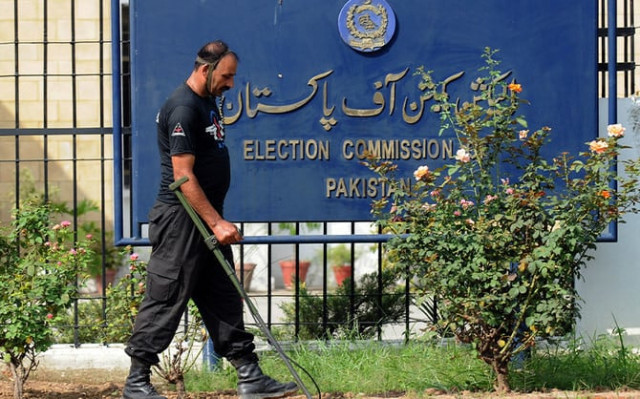ECP notifies changes in election law
Commission asks parties to file objections or suggestions by Oct 17

The Election Commission of Pakistan (ECP) on Saturday issued a notification highlighting its amendments to the electoral rules, and asking the political parties to file their objections or suggestions in connection with the changes to its secretariat in the federal capital by October 17.
The commission has made it mandatory for candidates to run a separate bank account for the funds spent on the polls.
“The present situation so warrants and it is expedient to carry out further amendments [to] Rules 51, 52(3), 56(3), 66(4), 71(2), 84(4), 85(2), 87(2), 134(1), 134(2), 134(2A), 134A, 137(1), 143(1), 143(4), 158(1), 158(3), 161(1), Form41(g), Form41(h)(ii), Form 67, Form 68, and Annexures, and Form 69,” the notification dated September 22 read.
Read More: Polls expected before end of Jan, date pending
According to the changes in Rule 51, candidates will have to open an bank account or dedicate an existing account to maintain the transactions of election expenses.
They will also be required to attach the bank account statement beginning with entries seven days prior to the election schedule with the nomination papers for election to an assembly or the Senate.
The bank account opened or dedicated for this purpose should not be a joint signatory one.
As per the amendment to Rule 52-3, the sum deposited by a candidate under Section 61 will be nonrefundable and transferred to the government treasury. Therefore, sub-rule 4 of Rule 52 stands omitted.
Read More: ECP gets census data for fresh delimitation
According to the amendment to Rule 56-3, the returning officer (RO) will publish the list of contesting candidates with their respective symbols at some conspicuous place in their office. The RO will provide a copy of the list to the contesting candidates, district election commissioner, provincial election commissioner and the ECP, which will upload it on its website for display.
The change in Rule 66-4 stated that after ballot papers had been issued to all voters, the RO would place all the counterfoils of postal ballot papers in one or more packets, sign and seal them.
The RO will then write on the packet[s] a brief description of its contents, the number of counterfoils contained, name of the constituency and date of sealing.
The change in Form 41(h)(ii) stated that if the cover did not reach the RO before the election day, the vote would not be counted.
According to the amendment to Rule 84-4, if the results are incomplete by 2am on the day immediately following the polling day for any reason, the RO will communicate the provisional results consolidated till that time to the ECP along with reasons for the delay, in writing, while listing the polling stations from which results are awaited and thereafter will send the complete provisional results as soon as compiled but not later than 10am.
As per the change in Rule 85-2, before consolidating the results, the RO will in the presence of the contesting candidates and one of their election agents duly authorised by the candidate, as may be present, open packet-2 containing the ballot papers excluded from the count by the presiding officer and also the packet-6 and packet-9 containing, respectively, the tendered ballot papers and challenged ballot papers excluded from the count and scrutinise each such ballot paper as was excluded from the count.
According to the amendment to Rule 134-1, a candidate will maintain a register of receipts and payments (cashbook), record/details of bills, invoices, deliveries challans, receipts, acknowledgements and vouchers in support of every payment made in respect of election expenses.
The change in Rule 134-2 read that the contesting candidate and a returned one would submit to the RO the details of election expenses in Form C as well as the details of polls expenses and the details of campaign finance in Forms 67 and 68.
Provided that if a candidate permits a person to incur election expenses on their behalf, the candidate will abide by the code of conduct and also maintain the record/details of election expenses incurred for their election campaign by that person showing their name, copies of identity documents, types of expenses incurred, source of income of the person, address and phone number.
The ECP will reconcile the total sum of expenses recorded in Forms C, 67 and 68 within the permissible limit of the election expenses of the returned candidate.
According to the amendment to Rule 143-1, on the filing of a reply by the respondent, the Election Tribunal may, with the consent of the parties, fix a time schedule for trial and disposal of the petition within a 180-day period from the date of filing of the petition till the announcement of the final judgment in the case.
As per the change in Rule 158-1, the leader of each political party under their signature will issue a schedule of the intra-party election and inform the ECP 15 days before the conduct of the intra-party election.
Within seven days of the completion of intraparty elections, the party leader will submit a certificate to the ECP in Form-65 specifying that the intra-party elections were held in accordance with the party’s constitution and the provisions of the Elections Act along with a report covering the following aspects:
The political party will submit a detailed report on the conduct of intra-party elections to the ECP within seven days of the completion of intra-party elections; the party will provide a voter list and details of voter- verification mechanisms used to ensure that only eligible members participated in the intra-party election; the report will outline the procedures followed during the election, including nomination processes, eligibility criteria for candidates, voting methods, vote-counting mechanisms, and dispute resolution procedures; the party will make the intra-party election report publicly available, either on its website or by providing copies to interested stakeholders.
According to the amendment to Rule 158-3, the fine imposed by the ECP on a political party will be deposited in the government treasury.



















COMMENTS
Comments are moderated and generally will be posted if they are on-topic and not abusive.
For more information, please see our Comments FAQ